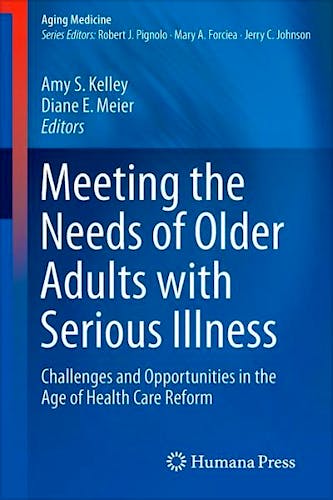

No hay productos en el carrito



Meeting the Needs of Older Adults with Serious Illness. Challenges and Opportunities in the Age of Health Care Reform (Aging Medicine, Vol. 2)
Kelley, A. — Meier, D.
1ª Edición Noviembre 2014
Inglés
Tapa blanda
235 pags
500 gr
null x null x null cm
ISBN 9781493904068
Editorial HUMANA PRESS
LIBRO IMPRESO
-5%
103,99 €98,79 €IVA incluido
99,99 €94,99 €IVA no incluido
Recíbelo en un plazo de
2 - 3 semanas
About this Book
- Identifies role of palliative care in improving quality andreducing costs across a range of health care settings and organizations
- Prioritizes policy changes necessary to standardize access to quality palliative care
- Connect new delivery and payment incentives under the ACA to opportunities for growth in palliative care services
Meeting the Needs of Older Adults with Serious Illness: Challenges and Opportunities in the Age of Health Care Reform provides an introduction to the principles of palliative care; describes current models of delivering palliative care across care settings and examines opportunities in the setting of healthcare policy reform for palliative care to improve outcomes for patients, families and healthcare institutions. The United States is currently facing a crisis in health care marked by unsustainable spending and quality that is poor relative to international benchmarks. Yet this is also a critical time of opportunity. Because of its focus on quality of care, the Affordable Care Act is poised to expand access to palliative care services for the sickest, most vulnerable, and therefore most costly, 5% of patients- a small group who nonetheless drive about 50% of all healthcare spending. Palliative care is specialized medical care for people with serious illnesses. It focuses on providing patients with relief from the symptoms, pain, and stress of a serious illness—whatever the diagnosis or stage of illness. The goal is to improve quality of life for both the patient and the family. Research has demonstrated palliative care’s positive impact on health care value. Patients (and family caregivers) receiving palliative care experience improved quality of life, better symptom management, lower rates of depression and anxiety, and improved survival. Because patient and family needs are met, crises are prevented, thereby directly reducing need for emergency department and hospital use and their associated costs. An epiphenomenon of better quality of care, the lower costs associated with palliative care have been observed in multiple studies. Meeting the Needs of Older Adults with Serious Illness: Challenges and Opportunities in the Age of Health Care Reform, a roadmap for effective policy and program design, brings together expert clinicians, researchers and policy leaders, who tackle 16 key areas where real-world policy options to improve access to quality palliative care could have a substantial role in improving value.
Content Level » Professional/practitioner
Keywords » Care Competencies - Hospice - Long Term Care - Outcomes - Palliative
Care - Quality Measures
Related subjects » Family & Geriatric Medicine - Medicine
Table of Contents
Introduction to Palliative Care.- Palliative Care in Hospitals.- Palliative Care in the Community.- Palliative Care in Long Term Care.- Hospice.- Growth of Palliative Care Programs and Implementation Challenges for New Programs.- Access to Palliative Care.- Palliative Care Quality Measures and Outcomes.- Palliative Care Impact on Costs.- Palliative Care’s Role in New Delivery and Reimbursement Models.- Accountable Care Organizations and Bundled Payments.- Medical Education and Palliative Care Competencies.- Policy Priorities and Challenges
© 2025 Axón Librería S.L.
2.149.0